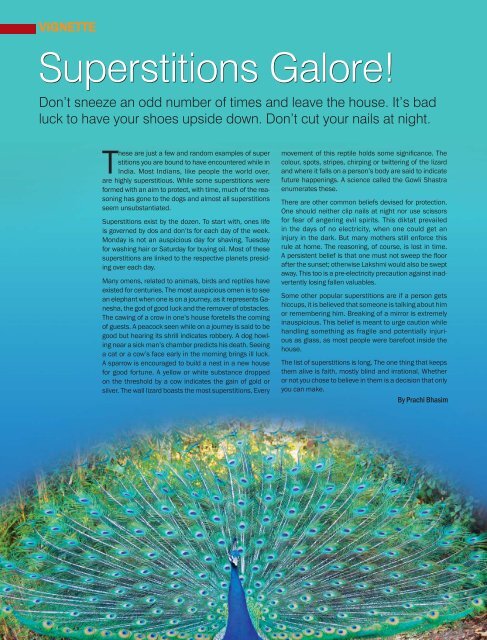to view Expat - LB Associates
to view Expat - LB Associates
to view Expat - LB Associates
Create successful ePaper yourself
Turn your PDF publications into a flip-book with our unique Google optimized e-Paper software.
VIGNETTE<br />
Superstitions Galore!<br />
Don’t sneeze an odd number of times and leave the house. It’s bad<br />
luck <strong>to</strong> have your shoes upside down. Don’t cut your nails at night.<br />
These are just a few and random examples of super<br />
stitions you are bound <strong>to</strong> have encountered while in<br />
India. Most Indians, like people the world over,<br />
are highly superstitious. While some superstitions were<br />
formed with an aim <strong>to</strong> protect, with time, much of the reasoning<br />
has gone <strong>to</strong> the dogs and almost all superstitions<br />
seem unsubstantiated.<br />
Superstitions exist by the dozen. To start with, ones life<br />
is governed by dos and don’ts for each day of the week.<br />
Monday is not an auspicious day for shaving, Tuesday<br />
for washing hair or Saturday for buying oil. Most of these<br />
superstitions are linked <strong>to</strong> the respective planets presiding<br />
over each day.<br />
Many omens, related <strong>to</strong> animals, birds and reptiles have<br />
existed for centuries. The most auspicious omen is <strong>to</strong> see<br />
an elephant when one is on a journey, as it represents Ganesha,<br />
the god of good luck and the remover of obstacles.<br />
The cawing of a crow in one’s house foretells the coming<br />
of guests. A peacock seen while on a journey is said <strong>to</strong> be<br />
good but hearing its shrill indicates robbery. A dog howling<br />
near a sick man’s chamber predicts his death. Seeing<br />
a cat or a cow’s face early in the morning brings ill luck.<br />
A sparrow is encouraged <strong>to</strong> build a nest in a new house<br />
for good fortune. A yellow or white substance dropped<br />
on the threshold by a cow indicates the gain of gold or<br />
silver. The wall lizard boasts the most superstitions. Every<br />
movement of this reptile holds some signifi cance. The<br />
colour, spots, stripes, chirping or twittering of the lizard<br />
and where it falls on a person’s body are said <strong>to</strong> indicate<br />
future happenings. A science called the Gowli Shastra<br />
enumerates these.<br />
There are other common beliefs devised for protection.<br />
One should neither clip nails at night nor use scissors<br />
for fear of angering evil spirits. This diktat prevailed<br />
in the days of no electricity, when one could get an<br />
injury in the dark. But many mothers still enforce this<br />
rule at home. The reasoning, of course, is lost in time.<br />
A persistent belief is that one must not sweep the fl oor<br />
after the sunset; otherwise Lakshmi would also be swept<br />
away. This <strong>to</strong>o is a pre-electricity precaution against inadvertently<br />
losing fallen valuables.<br />
Some other popular superstitions are if a person gets<br />
hiccups, it is believed that someone is talking about him<br />
or remembering him. Breaking of a mirror is extremely<br />
inauspicious. This belief is meant <strong>to</strong> urge caution while<br />
handling something as fragile and potentially injurious<br />
as glass, as most people were barefoot inside the<br />
house.<br />
The list of superstitions is long. The one thing that keeps<br />
them alive is faith, mostly blind and irrational. Whether<br />
or not you chose <strong>to</strong> believe in them is a decision that only<br />
you can make.<br />
By Prachi Bhasim






